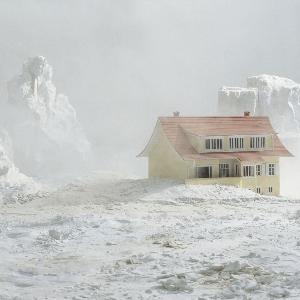
CAS LMU - Stephan Huber, Shining, Art at CAS, SoSe 2022
© Stephan Huber
Speaker: Prof. Vally Koubi, Ph.D. (ETH / Bern) | Chair: Prof. Dr. Miranda Schreurs, Ph.D. (TUM)
The academic literature on climate change and conflict has so far mostly focused on violent armed conflict and concerns about such security implications of climate change are increasingly appearing in defense and foreign policy communities. Yet, cooperative responses to climate change impacts are arguably more prevalent than violent outcomes and deserve more academic attention. For understanding how to foster peaceful responses to climatic hazards, studies of the full spectrum of cooperation and conflict responses are needed. Further, the framing of climate change as security threat may have the potential to lead societies to prepare for future resource conflicts instead of investing in peaceful, cooperative adaptation. This paper scrutinizes these issues using unique panel survey data of 6 waves from approximately 1400 households from 36 villages along the 250 kilometers of the Jamuna River in Bangladesh – an area affected primarily by floods and riverbank erosion. It includes a survey experiment which primes respondents to see climate change impacts as a security threat or, alternatively, as a focal point for increasing cooperation and investigates respondents’ cooperative and conflict-related attitudes and experiences. The new panel survey data hence allow for tracking cooperative and conflict responses to actual climatic disasters and simultaneously allow for studying whether a securitization framing alters attitudes and behaviors. Preliminary findings indicate that a securitization framing may have some impacts on subgroups of populations that have less direct experience with flood and erosion impacts and decrease their willingness to help others. However, there is no general securitization effect. The findings also provide evidence that flood and erosion impacts on households were associated with more conflict and less cooperation attitudes and behavior across several measures.
Please also note that this paper is co-authored with Nina von Uexkull (Uppsala University) and Jan Freihardt (ETH Zurich).
- Vally Koubi is a Professor (Titular) and Senior Scientist at the Center for Comparative and International Studies (CIS) at the Swiss Federal Institute of Technology Zurich (ETH), and a Professor at the Institute of Economics at the University of Bern, Switzerland. Additionally, she was formerly the Director of CIS at ETH Zurich.
Vally Koubi is a Visiting Fellow at CAS in the context of the CAS Research Focus “Prevention of Conflict”.
Registration
Registration is required for participation. If you are interested in our event, please contact us: info@cas.lmu.de
